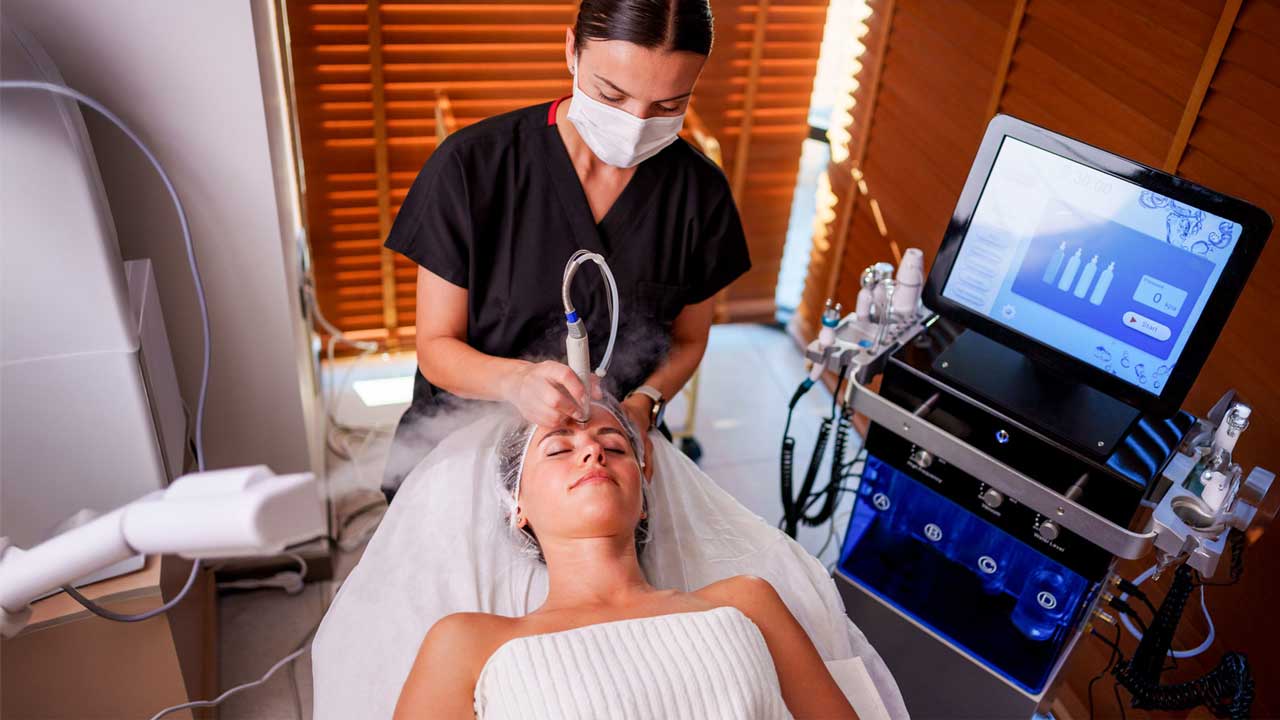Aesthetic nursing merges the precision of modern healthcare with the creativity of cosmetic enhancement. In this guide, learn how to break into this rewarding field, acquire the necessary skills, and leverage it all to grow as a healthcare professional.
What Is an Aesthetic Nurse?
Aesthetic nurses, also known as cosmetic nurses, perform non-invasive treatments with the goal of enhancing a patient’s appearance and confidence. Key services such nurses offer include:
- Injectable Treatments: Administering Botox, dermal fillers, and neuromodulators
- Skin Rejuvenation: Performing chemical peels, microneedling, and laser therapies
- Body Contouring: Utilizing non-surgical reshaping techniques
- Patient Guidance: Educating clients on post-treatment care and maintenance
Aesthetic nurses work in diverse settings, such as medical spas, plastic surgery clinics, dermatology offices, and outpatient surgical centers. Success in this role requires technical expertise, artistic judgment, interpersonal communication skills, and problem-solving abilities.1
Steps to Become an Aesthetic Nurse
1. Earn Your Nursing Credentials
Begin your journey by completing a nursing program. The degrees we offer at West Coast University are a great way to start. There are a couple of different routes to choose from:
- Associate Degree in Nursing (ADN) program: A 2–3-year program focusing on core nursing skills.
- Bachelor of Science in Nursing (BSN) program: Typically, a 4-year degree offering advanced training in leadership and patient care. However, at WCU you can earn your BSN in as little as 39 months.
2. Obtain RN Licensure and Gain Clinical Experience
After completing your degree, you’ll need to pass the NCLEX-RN exam to become a licensed nurse. Employers generally look for:
- At least two years of clinical experience in core nursing competencies.
- A minimum of 1,000+ hours in relevant specialties, such as dermatology, plastic surgery, or acute care.
Pro Tip: Seek experience in areas directly related to aesthetics, such as outpatient dermatology or plastic surgery clinics.
3. Pursue Specialized Aesthetic Nursing Training
Develop expertise in aesthetic procedures through targeted certifications and hands-on workshops. Key areas of focus include:
- Injectable treatments like Botox and dermal fillers
- Advanced skincare treatments and laser technologies
- Body contouring techniques and safety protocols
Certifications to consider:
- Certified Aesthetic Nurse Specialist (CANS): Demonstrates expertise in aesthetic nursing.
- Certified Plastic Surgery Nurse (CPSN): Recognizes proficiency in plastic surgery care.
- Dermatology Certified Nurse Practitioner (DCNP): For nurses specializing in dermatology.
Note: The CANS certification requires recertification every three years and requires either 45 contact hours of continuing education or retaking the certification exam.
4. Establish Your Career
Explore diverse opportunities in aesthetic nursing, including:
- Working in high-end medical spas or collaborating with plastic surgeons
- Gaining experience in dermatology offices or outpatient surgical centers
- Pursuing leadership roles or specializing in advanced techniques
- Opening an independent practice, subject to state regulations
- Attaining further advanced nursing credentials
State Specific Requirements
Each state has unique requirements for practicing aesthetic nursing. Below are licensing and advanced practice regulations for three key states:
State-Specific Licensing Requirements for 2025
- California:
- Hold a valid California RN license
- Complete an accredited ADN or BSN program. BSN programs like the oneswe offer at WCU-LA, WCU-Orange County, and WCU-Ontario are excellent options to prepare you for the NCLEX
- Pass the NCLEX-RN examination2
- Florida:
- Hold an active RN or LPN license from the Florida Board of Nursing (the ADN program at WCU-Miami is a great place to start)
- Complete specialized training in aesthetics
- For Advanced Practice Nurses (APRNs):
- Hold a clear, active Florida APRN license
- Complete 3,000 clinical hours under physician supervision within the past 5 years
- Complete graduate-level coursework, including 3 semester hours in differential diagnosis and 3 semester hours in pharmacology3
- Texas:
- Hold a valid Texas RN license
- Complete an accredited ADN or BSN programlike the one we offer at WCU-Texas
- Pass the NCLEX-RN examination4
Why Choose Aesthetic Nursing?
- Growing Need: Non-surgical procedures are on the rise.5
- Creative Fulfillment: Combine scientific knowledge with artistry to achieve natural enhancements.
- Variety: Explore working with the wide range of treatment types that are considered part of aesthetic nursing.
The Importance of Continued Education
Aesthetic nursing evolves rapidly with technological advancements. Stay ahead by:
- Attending workshops on emerging treatments
- Earning advanced certifications in injectables or laser technologies
- Networking with industry professionals through organizations like the American Association of Aesthetic Medicine and Surgery (AAAMS)
Aesthetic Nursing FAQs
What Skills Are Essential for Success?
- Strong understanding of facial anatomy
- Artistic judgment for achieving natural enhancements
- Excellent communication for personalized patient care
- Problem-solving abilities to address treatment challenges
Is Prior Nursing Experience Necessary?
Yes. Clinical experience builds the foundational skills required for patient safety and effective treatments.
How Do I Build My Portfolio?
Gain hands-on practice during training, document your work, and gather testimonials from satisfied clients.
Start Your Journey Today
Aesthetic nursing offers practitioners a unique opportunity to blend their healthcare expertise and artistic vision. Whether you’re just beginning your nursing education or advancing your career, consider enrolling in programs like the ADN programs or BSN programs at WCU to take the first step toward this exciting and rewarding field.
- Nurse.org, How to Become an Aesthetic/Cosmetic Nurse | Salary 2025, https://nurse.org/resources/how-to-become-aesthetic-cosmetic-nurse/
- California Board of Nursing, Steps to Become a California Registered Nurse, https://www.rn.ca.gov/careers/steps.shtml
- Florida Board of Nursing, Advanced Practice Registered Nurse, https://floridasnursing.gov/licensing/advanced-practice-registered-nurse/
- Texas Board of Nursing, Frequently Asked Questions – Licensure, https://www.bon.texas.gov/faq_licensure.asp.html#:~:text=To%20be%20eligible%20for%20licensure,your%20endorsement%20application
- PubMed, National Center for Biotechnology Information, National Library of Medicine, National Institutes of Health, Trends in Surgical and Nonsurgical Aesthetic Procedures: A 14-Year Analysis of the International Society of Aesthetic Plastic Surgery-ISAPS, https://pubmed.ncbi.nlm.nih.gov/39103642/
WCU provides career guidance and assistance but cannot guarantee employment. The views and opinions expressed are those of the individuals and do not necessarily reflect the beliefs or position of the school or of any instructor or student.



